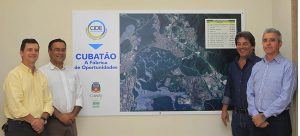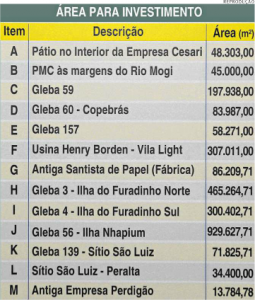
A partnership signed between Cubatão City Hall and the polo industries transformed the Center for Integration and Development (Cide), as a trustee of the Industrial Pole condominium, through contacts with investors and companies interested in installing transformation industries in the city, using raw materials manufactured by local base industries.
The agreement, which continues the “Cubatão – A Fábrica de Oportunidades” program, was consolidated between mayor Ademário Oliveira and Cide’s executive director, Valdir José Caobianco, on Wednesday. The event is supported by the Center of Industries of the State of São Paulo (Ciesp) – Cubatão Regional.
Cide, as trustee of the industrial condominium of the polo, receives in its premises representatives of companies and investors, in close relations with the Secretary of Planning of the City Hall, Pedro de Sá Filho (who is also vice mayor of the city ). He selected areas in Cubatão with potential for the installation of new projects, indicating detailed locations on an exposed map of the Ciesp Cubatão region, showing advantages offered by neighborhoods with base industries, road and rail access, and the City’s fiscal incentives for investors . Groups interested in knowing the areas and incentives will be received at the Cide by the manager of the two entities, Valmir Ramos Ruiz (contacts by phone 13 3361-1388). He will assist investors, conduct contacts with the City Hall and detail the proposals to support the public authorities, through Pedro de Sá Filho.
The partnership strengthens Cide’s condominium, acting as a contact facilitator and associate agent to reduce share costs common to all partners, as already occurs in the relationship with the base industries. Launched in March, during a seminar at the Brazilian Chemical Industry Association (Abiquim) in São Paulo, the industrial condominium follows strategic planning similar to association organizations of purposes installed there in other industrial centers, within the principles established by Agenda 21.
“We are convinced that Cubarte’s industrial complex, under the management of Cide, is fully prepared to receive new processing industries. With excellent logistics infrastructure, quality raw materials for its large companies, skilled labor and integration with public authority, commerce, organs and communities, the municipality offers the best conditions for revitalizing the country’s industrial sector, “says Valdir José Caobianco, executive director of the Center for Integration and Development (Cide).
Region has advantage
Valdir José Caobianco points out 11 reasons for new companies to settle in the Polo de Cubatão. The main objective of the polo industries, already integrated with Cide’s condominial management, is to develop a permanent campaign to attract new enterprises that complement the base industry already installed in the Municipality since the 60’s.
The base industry manufactures products that are used by other industries called processing industries because they use the basic inputs to produce fine materials put on the market. One example: basic materials companies, such as Usiminas, manufacture steel sold to the manufacturing industries to produce automobiles, refrigerators, civil construction profiles, among others. The City and Cide are committed to showing businessmen from Brazil and abroad that Cubatão still has many free areas in its territory to install industries that transform the base products manufactured in the city, such as fertilizers, rubber chemicals, oxygen, chlorine and derivatives, among others.
The positive side of this industrial actor is that it generates new jobs for residents of all the region and increases the tax collection of the City Hall, for execution of new works in the City.
“Cubatão is a factory of opportunities for the development of the Industry,” says Caobianco. The polo companies are associated with the Ademário Government, with the implementation of a condominium managed by Cide, to unite in a synergistic way (with the same objectives) the search for cost reduction in strategic interests common to already established companies and future entrepreneurs , as security through the Mutual Assistance Plan, human resources, legal issues, medical services and community dialogue actions through the Consultative Community Council (CCC) of the Cubatão Complex.
Among the highlights of the 11 reasons to receive investments, the polo – which already has 12 major industries in the petrochemical, chemical, steel and fertilizer sectors – has an abundant range of energy (including thermoelectric plants) and water, besides of complete logistics network with highways, railroads, coastal port services (with three nearby ports) and access facilities to the airports of the State Capital. These logistical alternatives link industries to the interior of São Paulo and to other states.
Cide offers tax incentives

For Mayor Ademário Oliveira, “Cubatão is a city ready for new investments”. And disrespect to the crisis that still lives, it has land with free areas and ready to receive new facilities of industries and companies. With the support of Cide-Ciesp and landowners in the city, the municipal secretariat of Planning, led by Deputy Mayor Pedro de Sá Filho, pointed out the existence of at least 2,365 million areas in 12 lands and sectors ready to deploy transformation.
Technical knowledge, historical evidence and hardworking labor in the implantation of industries are not lacking. Cubatão was the first petrochemical center in the country, located less than 70 km from the capital. In its territories, the first state refinery built by Petrobras was installed in the 1950s, in the wake of the establishment of chemical industries, one of the largest steel mills in the country and a pioneer fertilizer park, as well as producing chlorine and gases medicinal products. Cubatão already had the highest public per capita income in the country.
“But the old managements of municipal governments failed to translate this wealth into welfare for the population. And the economic crisis installed since 2015 worsened the recession, leading to the suspension of industrial activities that mainly affected primary steel production and led to the drastic reduction of jobs”, says Ademário.
Now, according to the mayor, besides the City structure, located near the Port of Santos and the Capital of São Paulo, companies that settle in Cubatão will have as incentives, depending on the degree of investment, the exemption of IPTU and ISS.
“We have a specific planning sector to receive new investments and priority attention to reduce bureaucracy in the processes, by our deputy mayor and now with the support of Cide-Ciesp.”
Source: A Tribuna newspaper
